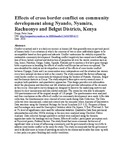| dc.description.abstract | Conflict is natural and it is a daily occurrence in human life thus generally seen as part and parcel of human body. It is a situation in which the concerns of two or more individuals appear to be incompatible based on their goals and interests. Conflict undermines the stability required for sustainable community development. Handling conflict negatively has caused much sufferings, loss of lives, hatred, mistrust and destruction of properties all over the world, countries such as Iraq, Israel, Palestine, Congo, Sudan, Uganda, Rwanda just to mention a few have gone through bitter experiences in handling the effects of conflict and Kenya has not been exceptional.
The area identified for study is not developed as a result of the effects of cross border conflict between Kipsigis, Kisiis and Luo communities since independence and the situation has worsen every time national election is held in the country. The study examined the factors influencing cross border conflict on community development along the borders of Nyando, Nyamira, Belgut and Rachuonyo districts in Kenya. The study adopted a descriptive survey research since it employs both qualitative and quantitative approaches. This design provides rich information about the phenomena and describes real life situation and provides information of the elements as they occur. Descriptive survey designs are designed to discover the underlying motives and desires to elicit unconscious and also related materials.
The researcher was able to administer 104 questionnaires out of the original sample of 120 people. The questionnaires were analyzed and thus conclusions on the effects of conflict on community development were made. After data collection, the Questionnaires were cleaned of errors made during Data Collection. The Data collected were summarized, coded and entered into the computer where Analysis of Quantitative Data was done using the Statistical Package for Social Scientists [S.P .S.S]. Frequency Means and Percentages were used for Descriptive Statistics while Chi-Square, T-Test, FTest and Z- Test at 5% level of significance were used for inferential statistics. Qualitative Data from provincial administration and other NGOs working in the area were analyzed using Checklist, Matrix Analysis.
Data collected through qualitative method were analyzed using the thematic approaches under the headings such as Causes, Effects of conflict, participants' perception such as Perceived power, Political factors. The study found that socio-economic factors are of significant value in terms of influencing community, and the government is doing very little to address cross border conflict in the areas for study. The study recommends that the government need to do allot more in terms of providing security to its citizens and besides this come up with a clear policy on peace Building and conflict resolution. | en_US |

